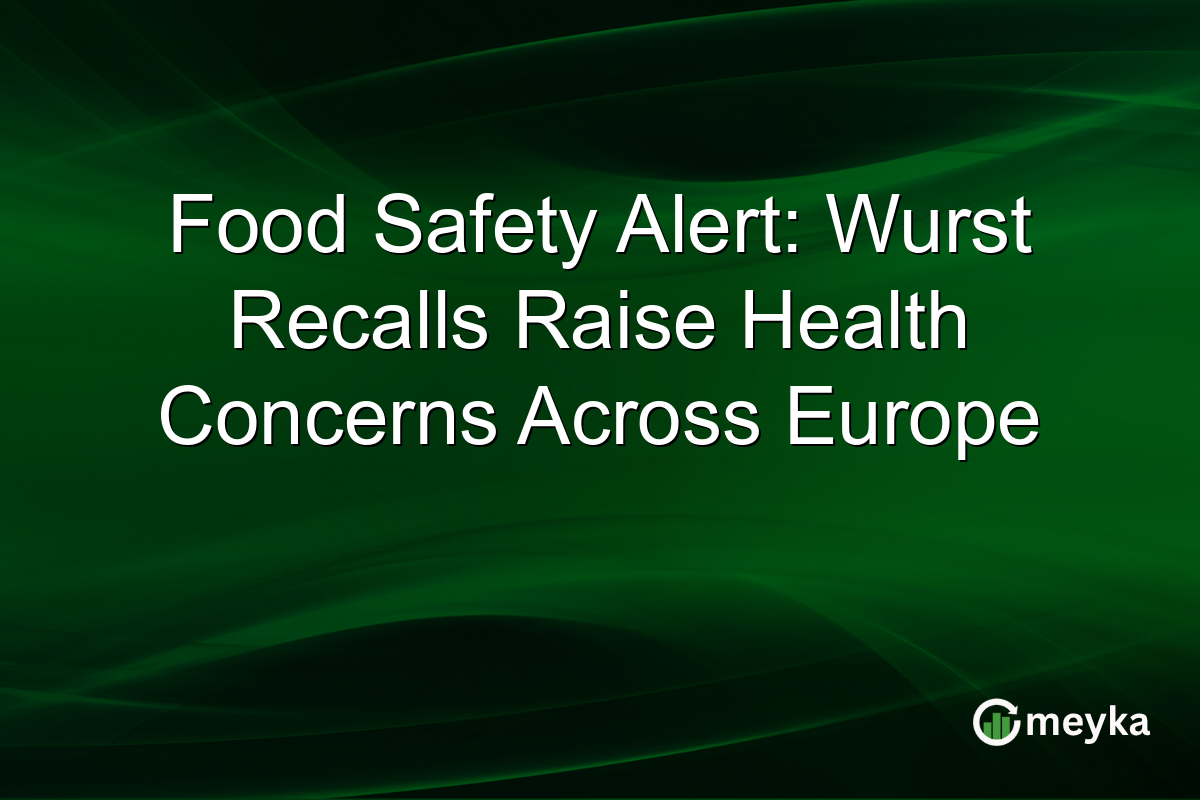Food Safety Alert: Wurst Recalls Raise Health Concerns Across Europe
The food industry in Europe is facing a critical moment as several Wurst products have recently been recalled. These recalls, affecting Germany, the Netherlands, and Austria, stem from contamination with harmful bacteria such as Listeria and EHEC. This has raised significant concerns about food safety standards, affecting public confidence in processed meats. The recalls highlight the need for stringent quality controls and prompt consumer warnings to prevent health risks.
Wurst Product Recalls and Impact on Food Safety
The recall of multiple Wurst products has largely been driven by discoveries of Listeria contamination as well as EHEC bacteria, both of which can pose serious health risks. Listeria is particularly concerning due to its potential to cause severe illness in vulnerable individuals like pregnant women and the elderly. The European countries involved, including Germany, have proactively initiated recalls to mitigate these risks.
Recent updates from Ruhr24 detail the extended recalls from retailers like Kaufland and Netto, where Wurst items tested positive for these dangerous bacteria. The recalls have prompted an urgent call to review food safety protocols across the supply chain to prevent future incidents. The increased focus on these recalls signals a shift towards stronger consumer safeguards.
Health Risks Linked to Listeria and EHEC
Listeria and EHEC bacteria pose serious health threats. Consuming products contaminated with these bacteria can result in symptoms ranging from mild gastrointestinal discomfort to severe neurological complications, according to reports by Merkur.de. Particularly, EHEC can lead to bloody diarrhea and, in severe cases, kidney failure.
Food safety risk management is crucial, and these incidents have placed pressure on food producers to ensure rigorous testing and quality checks are in place. Consumers are advised to stay informed and check recent recall lists regularly to avoid affected products. These health concerns have drawn attention to the importance of reliable and transparent safety standards in the food industry.
Economic and Regulatory Implications
The recent Wurst recalls not only highlight health concerns but also have economic implications. The aftermath of these events can result in significant financial losses for producers and retailers involved. Moreover, the entire supply chain is impacted as additional resources need to be allocated to manage the recall process.
According to Sol.de, authorities in regions like Rheinland-Pfalz have already commenced detailed investigations to trace the contamination sources and prevent recurrences. These incidents may lead to tighter regulations and more frequent inspections, ensuring food safety becomes a top priority. Compliance with these regulations will be crucial for businesses to regain consumer trust and stabilize their market positions.
Final Thoughts
The recent recalls of Wurst products across Europe signal a pressing alert in food safety norms. Listeria and EHEC contamination pose substantial health risks, prompting immediate recalls and regulatory review. While the impact on public health is a primary concern, the economic repercussions for businesses are also significant. Strengthening food safety protocols and ensuring compliance with rigorous standards is essential. For consumers, staying informed about current recalls is key to safeguarding their health. These actions will help restore trust in the food supply chain. As the situation unfolds, Meyka can provide real-time insights to help stakeholders navigate these challenges effectively.
FAQs
Wurst products were recalled due to contamination with harmful bacteria like Listeria and EHEC, both of which can pose serious health risks to consumers. Immediate recalls help mitigate these risks.
Listeria can lead to severe illness, especially in vulnerable populations, and EHEC can cause symptoms like bloody diarrhea and kidney failure. Prompt recognition and response to these risks are crucial.
These recalls may lead to tighter food safety regulations and frequent inspections. Ensuring compliance with these standards is essential for maintaining consumer trust and market stability.
The recalls can lead to financial losses for producers and retailers due to disrupted operations and potential loss of consumer confidence. However, strengthening safety measures can help mitigate future risks.
Consumers should regularly check updates from official sources and retailers about product recalls. Following reliable news outlets and platforms like Meyka can provide timely information and insights.
Disclaimer:
This is for information only, not financial advice. Always do your research.






